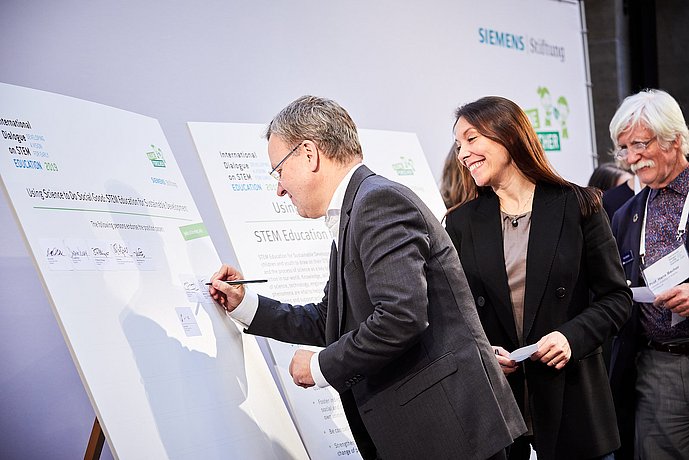Using Science to Do Social Good: STEM Education for Sustainable Development
STEM knowledge and the process of science can help understand global problems and support actions in society that address them in a meaningful and knowledge-based way. The orientation of individual actions towards certain explicit and reflected values enables us to act locally in such a way that we also take responsibility for the world around us. STEM Education for Sustainable Development encourages youth to draw on their STEM competence as a key basis for reasonable action in our world.

© René Arnold / Stiftung Kinder forschen
Integrated approach of STEM Education for Sustainable Development
The present paper argues for an integrated approach of STEM Education for Sustainable Development (“STEM4SD Education”). It analyzes critically how an integrated and transdisciplinary focus on inquiry-based STEM education could serve to enhance sustainable development and build capacity for future generations. As such, the international paper promotes the idea of a transdisciplinary framework of education, acknowledging the complex context of global challenges and the need for integrating values, ethics, and world views towards the development of sustainable mindsets and using science to do social good. After reviewing the context and pedagogical basis of this approach, the paper presents a set of goals and guiding principles of STEM Education for Sustainable Development.
According to the position paper, STEM Education for Sustainable Development (STEM4SD Education) offerings should be oriented towards the following guiding principles:
- Promote inquiry-based learning and scientific thinking and practice.
- Encourage interactive, learner-centered teaching that enables exploratory, action-oriented, reflective and transformative learning.
- Reinforce a whole institution approach that focuses on the systemic development of the educational facility towards quality education and sustainability and considers the role of management at the school, state or government level.
- Foster independent thinking and responsible action that takes place in the learner context and involves the institution’s social and natural environment, providing the opportunity to implement and experience real changes in the learners’ own community, which then strengthens their capacity for agency.
- Be compatible with the goals of sustainable development.
- Strengthen evidence-based and reasoned argumentation, recognize complexity, promote diversity of opinion and change of perspectives, and encourage the critical reflection of values.
- Empower present and future generations to use science, technology, engineering, and mathematics (STEM) skills and reflective reasoning to solve complex sustainability problems.
The paper reflects the current state of thinking and discussion on the topic, as shared among the involved international experts. The dialogue with experts from science, practice and policy continues.
Do you agree with the guiding principles listed above? You can endorse the position paper here*.
*To endorse the paper, simply follow the button and then click on "In ONLYOFFICE öffnen" to add your name and details in the document. Thank you.
International Programme Committee Developed the Position Paper
With the preparation of the second International Dialogue on STEM Education (IDoS) on the subject of “STEM Education for Sustainable Development”, a conference initiated by the Stiftung Kinder forschen (then "Haus der kleinen Forscher" Foundation) and Siemens Stiftung, an expert discussion within the international programme committee on the relation between science, technology, engineering, and math education (STEM Education) and Education for Sustainable Development (ESD) occurred. This discussion led to the development of the international position paper at hand clarifying the relation between STEM Education and Education for Sustainable Development.
The position paper was shared officially with the public and the press at the IDoS 2019 conference
Do you have questions, comments or notations to this paper? Please refer to the Scientific Director at Stiftung Kinder forschen, Dr Janna Pahnke